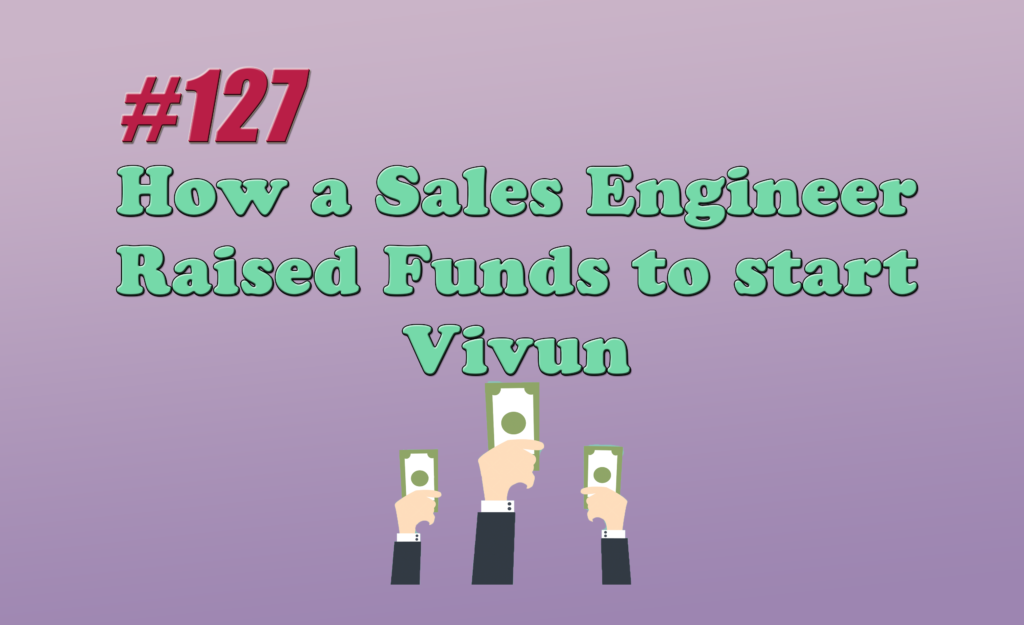
We are having an amazing time interviewing founders and CEOs of various startups for the past month. In today’s episode, we chat with Matthew Darrow, who has spent a huge chunk of his career as a Sales Engineer before starting his own company. It was a blast learning about his experiences from starting out as the youngest SE to becoming the VP of pre-sales almost overnight, the strategies he and his team used in raising money to fund the startup, and the influence of having great mentors and a support system on building and leading his own team today.
Matthew Darrow is the co-founder and CEO of Vivun, the first enterprise platform for pre-sales. He is passionate about pre-sales and has over 10 years of experience as an enterprise software leader growing businesses, building global teams, and delivering products.
Listen to our interview and learn more about:
- What Matt was doing before he entered the pre-sales space
- how he worked his way up from being a sales engineer to becoming a co-founder of Vivun
- why being told he was not qualified didn’t stop him from getting the job as an SE
- how he moved up from being the youngest sales engineer to the VP of pre-sales even without decades of experience
- the importance of having great top-down mentorship and a support system
- how his goal of starting a company allowed him to enter other areas of business
- how he pitched his startup idea to his CTO and co-founder John Bruce
- what other options do people have if they want to move away from sales engineering
- fighting the glass ceiling notion of Sales Engineers and pre-sales
- his partnership with John and the team and how they complement each other
- how to get investment funding for starting a company: qualify, target, get investment angels, make introductions, have the meetings at the right level, don’t come in through the front door, and come up with a knock-out pitch deck
Quotes:
Matt’s take on starting something early out of university: “What was interesting for me is by actually getting deep into the world of B2B early, I felt like I was able to absorb a whole lot of perspective on what those types of challenges are, and then still be in the position where, at a pretty young age, have a lot of energy to tackle a really formidable challenge which is starting something from nothing.”
How the sales cycle is changing and why that’s a good thing for Sales Engineers: “Services have never been more accessible, where customers are coming inbound in the sales process already having access to the service that they’re interested in, so the entire top of the funnel sales notion of just brute force, outbound messaging to get people in the door, that’s starting to change that dynamic, where the center of gravity moves from the relationship being built between the salesperson and the buyer to the center of gravity is the actual product itself, and the buyer is wanting to have discussions immediately with how this is gonna meet their needs, how it’s gonna expand in different ways, and who better than the SE to do that, the technical domain expert?”
On what a pitch deck should look like:
Your pitch deck should boil down to only three things:
- What’s your origin story, and what does that give you unfair market insight that another person doesn’t have?
- Is there a big opportunity out there that can be very easily articulated?
- Who is the team? Who is the team we’re placing our bet on?
Not So Fire Round
1. What do you love about being an entrepreneur?
Complete creative freedom, being in control of our own destiny and building a great team that comes along with it
2. What would you change about your role?
I can’t think of anything… To be honest, I’m having an absolute ball right now.
3. Any books or resources that you would recommend to someone who wants to start a company?
The Hard Thing About Hard Things: Building a Business When There Are No Easy Answers by Ben Horowitz
Over the Edge of the World: Magellan’s Terrifying Circumnavigation of the Globe by Laurence Bergreen
4. What separates the successful entrepreneurs from the ordinary or not so great ones?
One side is definitely the team and who you surround yourself with.
1- Knowing that you can’t do it alone, and that means mentors and it also means the folks that you wanna bring into the boat to start rowing with you.
2- Because it’s so challenging is to have a deep-seated passion for the problem that you’re solving. When you already put in 100 hours a week. you need to drum up that energy from somewhere.
If you enjoyed this podcast, please support the show by dropping a review or rating on iTunes. https://podcasts.apple.com/us/podcast/we-sales-engineers-resource-for-sales-engineers-by/id1378292171
And if you’ve been affected by COVID as an SE, please check out our Leave No SE Behind initiative so that we can help you. https://wethesalesengineers.com/no-se-left-behind-initiative/




This Post Has One Comment
Pingback: 4/1/1 Forging One's Path Beyond Sales Engineering | We The Sales Engineers